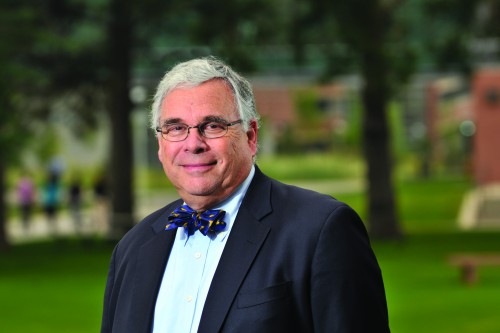Honoring the “dean of deans”
Richard Krugman, MD, steps down after 24 years of service
by Mark Couch, communications director, University of Colorado School of Medicine

Editor’s note: This article is an excerpt of “Sometimes Things Line Up Just the Way They Are Supposed to,” written by Mark Couch and published in the Fall 2014 issue of CU Medicine Today. It has been edited and published with permission.
For more than two decades, the sun rose in the east, flowers bloomed in the spring, snow fell on the mountains, the Broncos and Rockies took the field and Richard D. Krugman, MD, was the dean of the University of Colorado School of Medicine. As the longest-serving dean in the history of the School of Medicine and the longest-tenured leader of any medical school in the United States, Krugman earned the nickname “dean of deans.”
Krugman stepped down from his post at the end of March as his successor, John J. Reilly, Jr., previously of the Department of Medicine at the University of Pittsburgh, took office on April 1.
“He really is the gold standard of medical school leadership,” says Lilly Marks, University of Colorado’s vice-president of health affairs and executive vice chancellor of the Anschutz Medical Campus, of Krugman. “Dick provides a model of integrity, trust and collaboration.”
His tenure lends tremendous value to the entire institution, says CU President Bruce Benson. “He has a huge national reputation. He’s been here as dean for over 24 years, and that helps the School of Medicine, the Anschutz Medical Campus and the university. It’s a huge deal to have somebody with his stature.”
During his more than 24 years at the helm of the School of Medicine, he has presided over an era of unprecedented growth and prestige for the venerable institution by nurturing careers, mentoring colleagues and building a team of physicians and scientists who are training a generation of new leaders in research and medicine, while also providing world-class care to patients from across Colorado.
More than 4,000 physicians, physician assistants, physical therapists and medical scientists have earned degrees from the school and launched their careers during this time. Krugman has appointed all department chairs, major center directors and senior leadership at the school; established a workplace that values collaboration; directed the school’s move to the nation’s newest academic medical center campus; and strengthened the school’s financial foundation by overseeing the growth of its successful physician practice plan, University Physicians, Inc. (UPI).
He managed an enterprise that has a $1.1 billion annual budget and more than 3,000 faculty members who practice medicine at five affiliated health care facilities and other sites across the state and around the world. In 2014, UPI reported annual revenues of $609 million, its best year ever, extending an unbroken string of more than 20 consecutive years with double-digit percentage growth.
“So many people interpret leadership as ‘follow me up the hill; I’m going to lead you into battle,’” Marks says. “Dick established a sense of trust and created an environment that allowed people to do incredibly bold things without having a revolution. He built a team that was a real team and he empowered them. He was very generous in allowing them to do things and he didn’t try to steal the spotlight.”
Krugman plans to enjoy his family, including seeing more often his seven grandchildren who live in such faraway places as Boston, Baltimore, Atlanta and Tokyo.
He also hopes to pick up some scholarly pursuits that were delayed when he assumed his office. He served as director of the Kempe Center for the Prevention and Treatment of Child Abuse and Neglect from 1981 to 1992 and during his career has published more than 100 papers, chapters and editorials, and four books on the subject. As one of the nation’s leading experts on the subject, his plan was always to compare the difference between the American system and how European nations handle such cases.
“Professionally, I was on my way to do a study and try to make some major changes in the child abuse field in 1990 when I got into this job,” Krugman says. “I put off a sabbatical at that time to become acting dean because I thought it would only last a year or two. Interestingly, the problems I was trying to work on in that field are still there 24 years later, and I think I’d like to have the next phase of my career be just a professor working in the area that is pretty important for me.”
Posted in: Colorado Medicine

Comments
Please sign in to view or post comments.